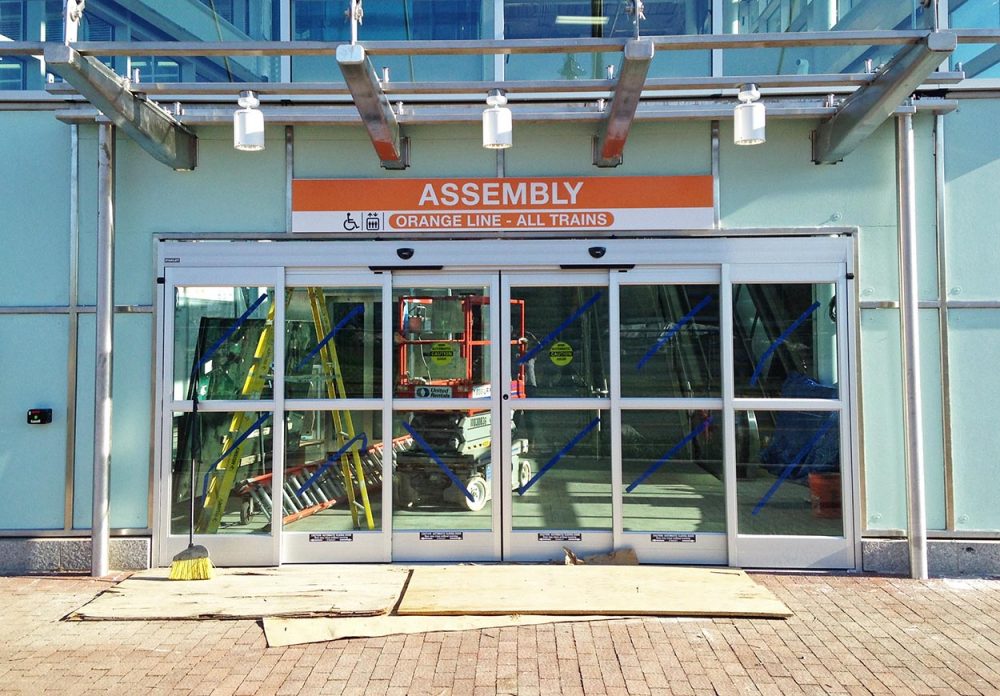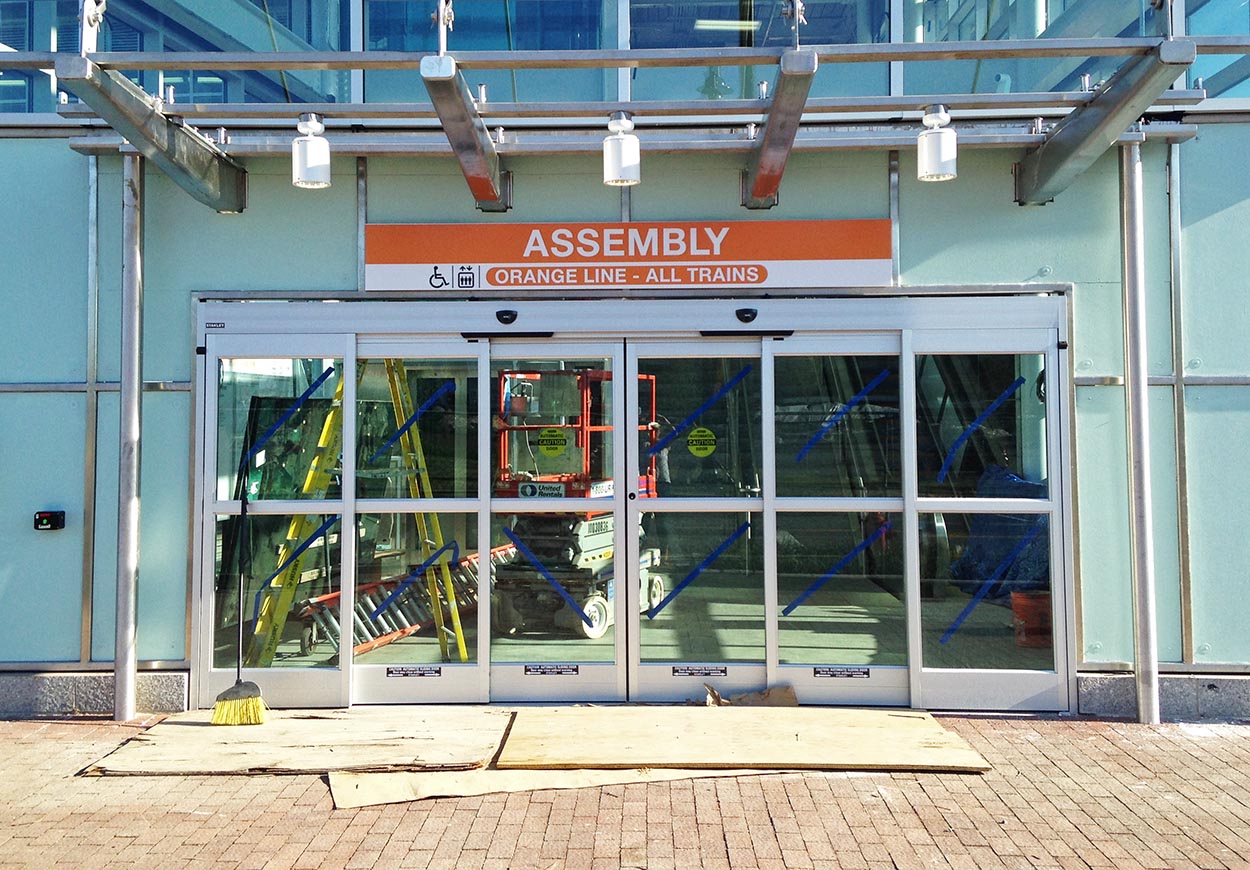Advertisement
Opening Of Assembly Station On Orange Line Celebrated As 'No Small Task'

Officials celebrated the opening of the first MBTA subway station in 27 years Tuesday, gathering on a parcel in Somerville where the new transit link was funded with the help of city financing and a private developer.

"I think this is the only T station the T hasn't paid for to build, maybe in its history," said Transportation Secretary Richard Davey, who said the developer Federal Realty Investment Trust and federal stimulus dollars helped finance Assembly Station.
Gray clouds threatened to cut the speaking program short and rain drizzled on officials heralding the arrival of the new Orange Line stop that started service early Tuesday morning.
"The Assembly Station is now open," said Mayor Joe Curtatone. "Those may seem like four small simple words, but getting to this station being built was no small or simple task."
The new MBTA station provides public transit access to the redeveloped Assembly Square, which was once home to an aging strip mall and other buildings before all that was razed and a brand new neighborhood of restaurants, a movie theater, housing and clothing shops opened to the public earlier this year.
Congressman Michael Capuano, a Somerville Democrat and former mayor, credited Gov. Deval Patrick for following through on his promise, and praised FRIT for being a developer with "vision and integrity," saying "everyone else was 'gimme, gimme, gimme.'"
"When he says he's going to do something he does it, which in the political world is not as often as you'd like to see. This man has done it once again. He deserves our appreciation and our constant, undying support and loyalty. Governor, you've got mine," Capuano said, noting new stops have sprung up on the Fairmount commuter rail line running through Boston neighborhoods and a new commuter station is in the works in Allston.
Advertisement
The Patrick administration is also moving forward with the Green Line Extension, a long-awaited transit project that would bring the trolley through Somerville and out to Medford.
Patrick, who was also hailed as "the best governor we've ever had in the Commonwealth" by Curtatone, said the federal government played a role in building the station.
"It was Recovery Act money that came right on time from the Obama administration with the advocacy of our delegation that enabled this project, which had been stalled, to get a fresh start," Patrick said.
Assembly Square lies along the banks of the Mystic River and is largely cut off from the rest of Somerville by Interstate 93 and Route 28. The site of a former automotive factory, Assembly Square became a focus of city planning in the 1990s, and Sen. Patricia Jehlen, a Somerville Democrat, credited the activist group Mystic River Task Force with realigning the aims of the project.
"This was not expected 20 years ago. Twenty years ago the vision for this area was parking lots and big box stores, and one group of people came together at the yacht club on a Saturday afternoon and started the Mystic View Task Force with a different vision and now it's coming true," said Jehlen, who also thanked state and federal taxpayers for funding the station.
The Winter Hill Yacht Club along the riverbank is the only building relatively untouched by the development.
The Swedish furniture seller Ikea backed out of plans to develop a piece of the site, and that land will soon be home instead to Partners HealthCare, according to President of the Board of Aldermen Bill White. Partners, the state's largest private employer, is consolidating its administrative offices in the city.
"They'll be the city's biggest employer the day they open," said Alderman Jack Connolly, who said Partner's plans to open its offices next to the new subway station in two years, adding 4,500 workers some of whom will live in the nearby development.
Connolly, who lives nearby Davis Square, which was transformed in the 1980s by the introduction of a Red Line station, told the News Service that Assembly Square has advantages because the redevelopment was already occurring before the train's arrival.
Curtatone said $130 million in taxpayer money was leveraged, building infrastructure to make way for a development that is estimated to return $30 million in annual state tax revenues, $18 million in local taxes, 22,000 construction jobs, and 19,500 permanent jobs. He said the first phase has already created 700 jobs, and the development is estimated to create 2,100 new housing units, including 260 affordable units, with the new station reducing an estimated 5,000 daily car trips.
"You have to build the infrastructure that draws employers," said Curtatone, who made the redevelopment a signature of his administration.
Don Briggs, of FRIT, said that amid the 2008 and 2009 economic collapse he and his family moved to the area.
"Shortly after that, Ikea decided not to build. And all of the house of cards - the public funding that we had built together, the partnerships that we had built together - began to crumble. I still have memories of being catatonic on my new kitchen floor and my wife stirring me, saying, 'It's going to be OK,'" Briggs told the crowd. He said meetings with city and state officials helped revive the project without Ikea.
The new station, which is still surrounded by an expanse of yet-undeveloped land, lies between Sullivan Square and Wellington Station. After many officials arrived at the event by car, Patrick, Davey and others boarded a train headed inbound to Boston from the new station ahead of a deluge of rain.